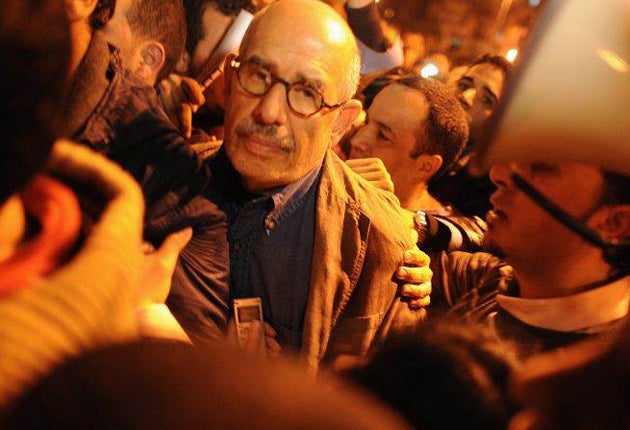Egypt: The diary of an unfinished revolution

Day 1: Tuesday 25 January
With the echoes of the Tunisian revolution still reverberating through the Middle-East (President Ben Ali was ousted on 14 January) thousands of Egyptians take to the streets of Cairo on a national holiDay to commemorate the police-force. The protesters call it a "Day of Wrath" and cries of "Down with Mubarak" are heard. There are fierce clashes between police and protesters, notably in Tahrir Square. Unrest is also reported in Alexandria, Mansura, Tanta, Aswan and Assiut. Several protesters, and one police officer, are reported to have been killed.
Day 2: Wednesday 26 January
Protesters return to the streets. Security forces pelted with rocks – and respond with tear-gas, water cannons and batons. Around 500 people arrested. At least one protester reported killed. White House spokesman Robert Gibbs urges the Mubarak regime to "demonstrate its responsiveness to the people of Egypt".
Day 3: Thursday 27 January
Mohamed ElBaradei, former head of the International Atomic Energy Agency, returns to Egypt and declares himself ready to "lead the transition". Clashes continue between protesters and security forces. There are reports of disruption to Twitter and Blackberry services. Internet traffic is interrupted.
Day 4: Friday 28 January
Tens of thousands return to the streets, with protests focusing on Cairo's Tahrir Square. The Army fires shots in the air. The headquarters of Egypt's ruling party are set alight. At least 18 people are reported killed in Suez and Cairo. Curfew ordered in major cities.
Day 5: Saturday 29 January
President Mubarak sacks his cabinet and names intelligence chief Omar Suleiman as Vice President. Looting is reported, and hundreds of prisoners are said to have escaped.
Day 6: Sunday 30 January
Many thousands of protesters remain in Tahrir Square. US President Barack Obama calls for Egypt to make an "orderly transition" to democracy. The US embassy advises American citizens in Egypt to consider leaving the country.
Day 7: Monday 31 January
President Mubarak continues to defy the growing clamour for him to step down. The White House calls on the regime to "address freedoms that the people of Egypt demand"; the EU calls for free and fair elections. Vice President Suleiman promises dialogue and constitutional reform. Opposition groups call for a "million man march" and general strike the following Day. Al-Jazeera reports interference with its broadcast signal.
Day 8: Tuesday 1 February
Huge numbers march through Cairo demanding Mubarak's immediate resignation. Mubarak says that he will not seek re-election in September.
Day 9: Wednesday 2 February
Mubarak's supporters launch counter-attacks against the protesters. Petrol bombs and iron bars are used in vicious fighting. At least three people are killed and 600 injured. The army is deployed but maintains a largely neutral role. The White House and the UN condemn the fighting; Vice President Suleiman insists the protests must stop before dialogue can begin. Internet services are mostly restored. But Google executive Wael Ghonim, a major online organiser of the protests, is reported to be missing, presumed arrested.
Day 10: Thursday 3 February
Mubarak tells reporters he would like to step down but thinks chaos will ensue if he does so now. Sustained bursts of heavy gunfire are reported in Cairo. According to the UN, around 300 people have been killed in the unrest so far.
Day 11: Friday 4 February
Thousands return to swell the crowds in Tahrir Square, for what they call a "Day of Departure". President Obama urges Mubarak to listen to the protesters.
Day 12: Saturday 5 February
Mubarak removes his son from a senior party post and invites opposition groups to negotiate reform.
Day 13: Sunday 6 February
The Muslim Brotherhood says it has "decided to participate in a dialogue but later says it's disappointed with the reforms on offer. Banks reopen, briefly.
Day 14: Monday 7 February
A 15 per cent pay rise for government employees is announced. Protesters drift back to work and fears voiced that the revolution is losing momentum. But Wael Ghonim is released and is hailed as a potential figurehead for democracy.
Day 15: Tuesday 8 February
Crowds return to Tahrir Square in greater numbers than ever. Ban Ki-moon, UN secretary general, calls for dialogue and peaceful transition.
Day 16: Wednesday 9 February
Protesters occupy the street of the parliament. Vice President Suleiman warns that calls for a campaign for civil disobedience are "very dangerous for society". Wael Ghonim declares himself "ready to die" to bring change to Egypt.
Day 17: Thursday 10 February
Mubarak refuses to stand aside, despite the army announcing that protesters' demands would be met. Mubarak's speech is met with angry chants of "Leave! Leave!" in Tahrir Square.
Join our commenting forum
Join thought-provoking conversations, follow other Independent readers and see their replies
Comments
Bookmark popover
Removed from bookmarks